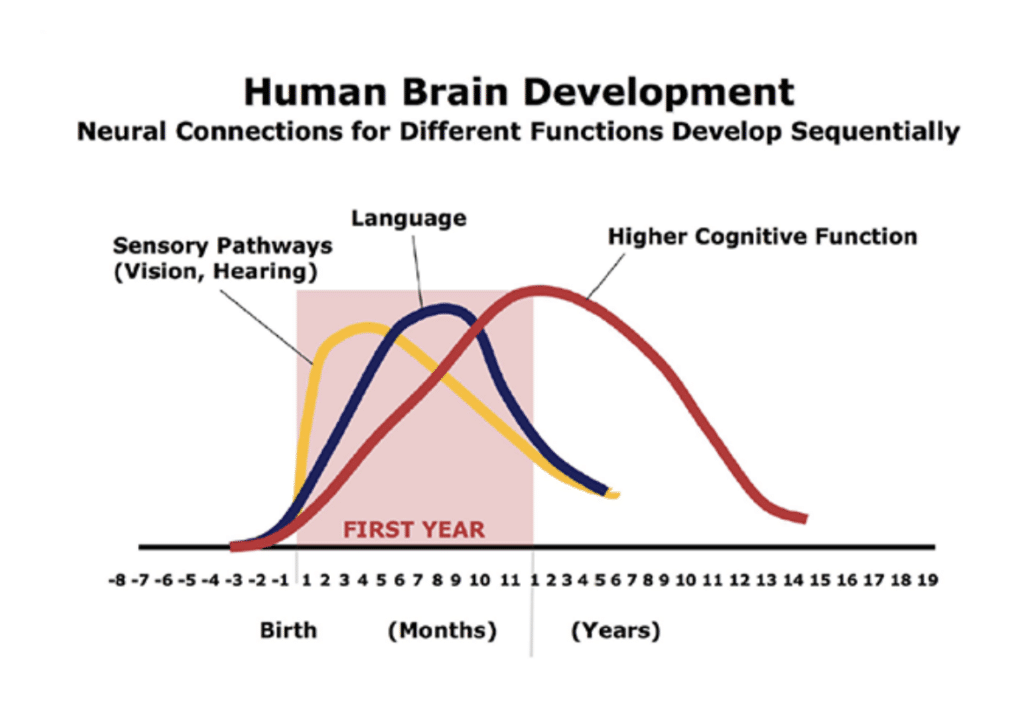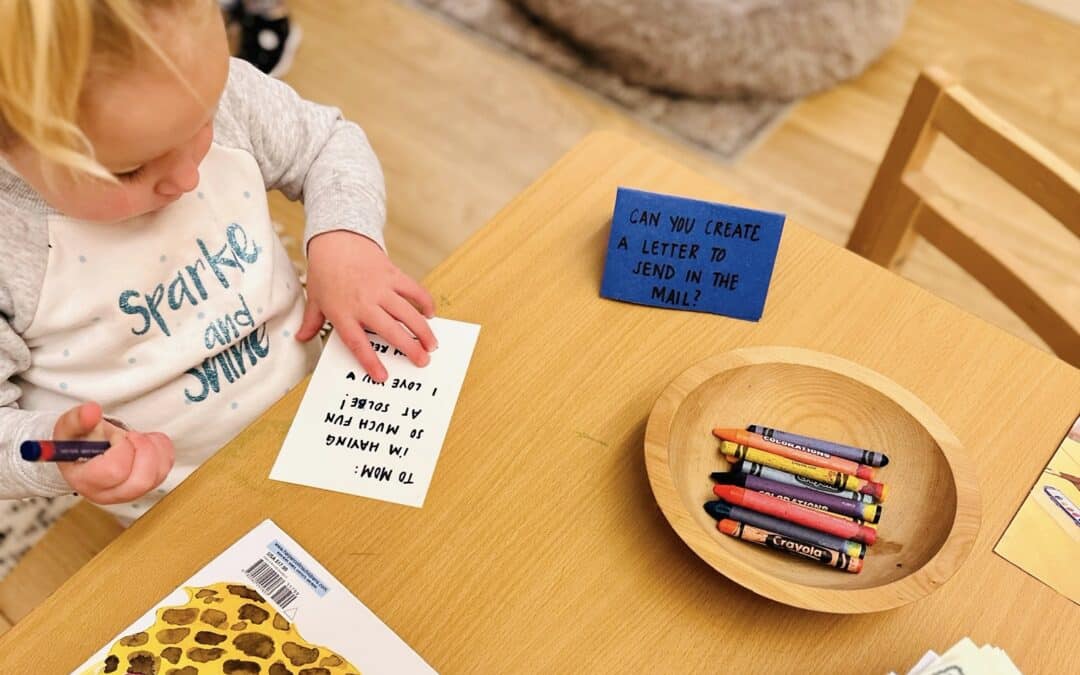“Early childhood remains the most sensitive period for brain development and is a window of opportunity to establish the foundation for future learning, health, and life success.”
What You’ll Learn
- What is helpful to know about early brain development?
- What types of experiences can optimize healthy brain development?
- What can I do to nurture my child’s brain development?
As a professional who works with and for young children, I value the neuroscience of early brain development to influence my practice. I also believe that this information should be accessible to all professionals working with young children, along with parents and caregivers. A basic understanding of the brain’s architecture and how this develops in early childhood enables professionals and parents/caregivers to make effective decisions that optimize children’s development.
Parents and caregivers, you are your child’s first and most important teacher. Helping support your child in their health and development begins with an understanding of how their brain develops and what experiences you can provide to support them as their first teacher. Don’t worry though, you won’t have to do this alone, “it takes a well-functioning family, supported by a community, to grow a brain” (Halfon et al., 2001, p. 18).
The Basics of Early Brain Development
The basic architecture of the human brain begins to form before birth and continues to develop well into early adulthood. As a newborn, a child’s brain already possesses billions of neurons—your child’s brain is essentially primed to learn as much information as possible. Between birth and age three, a child’s brain produces more than a million neural connections (or synapses) each second, helping infants quickly learn the essential skills needed to survive and thrive within their family and community (Pathways, 2023; Zero to Three, 2023).
Sensory pathways for basic vision and hearing are the first to develop, followed by early language skills and higher cognitive functions. After this period, neural connections begin to decrease through a process called pruning, allowing the developing brain circuits to become more efficient. While the brain remains flexible, or “plastic,” throughout life, your child’s brain is nearly fully developed by the time they reach kindergarten.

Source: C.A. Nelson (2000). Credit: Center on the Developing Child.
Early Childhood: The Window of Opportunity
Early childhood remains the most sensitive period for brain development, and is a window of opportunity to establish the foundation for future learning, health, and life success. Healthy and optimal brain development, however, is dependent on many factors, including genetic inheritance and early experiences with other people and the world. Early experiences, both adverse and positive, influence the quality of one’s brain architecture and shape the neural connections that allow us to develop lifelong skills like problem-solving, communication, self-control, and relationship-building (Zero to Three, 2016).
Nurturing Early Brain Development
Let’s pause for a moment and answer a question about the information we have learned: My child’s brain is nearly fully developed before they reach kindergarten, and positive experiences establish the foundation for healthy brain development as they grow. Does this mean I have to utilize this window of opportunity to provide every unique experience possible?
No. There is so much pressure to be a “good” parent. If you have a toddler, your day-to-day is already busy enough without me telling you to squeeze in at least one unique experience a day. Your child’s earliest experiences with you and/or other caregivers dramatically influence their brain development (Zero to Three, 2023); however, these positive experiences can be fostered during these daily moments:
- Develop a responsive relationship with your child where they feel secure, loved, and supported.
- Create a safe and loving environment that meets your child’s basic needs.
- Provide adequate nutrients – healthy foods help cell growth in the brain!
- Attend to your child’s emotional needs and show affection.
- Interact with your child by reading, singing, or talking to them (even when they don’t know what you’re saying!) and provide opportunities to play and explore.
- Protect your child from neglect and extreme or chronic stress – positive stress (moderate or short-lived uncomfortable experiences) is a necessary aspect of healthy development, however, extreme or chronic stress activates the body’s stress management system and shapes the brain’s architecture (Center for the Developing Child, 2007).
- Practice self-care – children’s potential to thrive depends on parent and/or caregiver well-being.
Empowering Takeaways
- From the moment your child is born, their potential is unlimited.
- You do not need to create elaborate experiences to nurture your child’s brain development.
- Responsive, secure, and loving relationships are the foundation for positive experiences.
Be vibrant and keep thriving!
This article was last reviewed or updated on October 20, 2023.
References
Center on the Developing Child. (2007). InBrief: The science of early childhood development. https://developingchild.harvard.edu/resources/inbrief-science-of-ecd/
Daelmans, B., Darmstadt, G., Lombardi, J., Black, M., Britto, P., Lye, S., et al. (2016, October 4). Early childhood development: The foundation of sustainable development. The Lancet 389(10064), 9-11. doi:10.1016/S0140-6736(16)31659-2
Halfon, N., Shulman, E., & Hochstein, M. (2001). Brain development in early childhood. Building Community Systems for Young Children. UCLA Center for Healthier Children, Families and Communities.
National Center on Birth Defects and Developmental Disabilities. (2023, February). Early brain development and health. Centers for Disease Control and Prevention. https://www.cdc.gov/ncbddd/childdevelopment/early-brain-development.html
Pathways. (2023). Understanding how your baby’s brain develops. https://pathways.org/babys-brain/?gclid=CjwKCAjwp8OpBhAFEiwAG7NaEpG-OhewUlmDuRH0sWMb_wHMep5bpH56me6i4a3yGKqpL7p99g6kKhoCSR4QAvD_BwE
The Lancet. (2016, October). Advancing early childhood development from science to scale: An executive summary. https://www.thelancet.com/pb-assets/Lancet/stories/series/ecd/Lancet_ECD_Executive_Summary-1507044811487.pdf
Unicef. (n.d.). Early childhood development: For every child, early moments matter. https://www.unicef.org/early-childhood-development
Zero to Three. (2016). Brain wonders: Nurturing healthy brain development from birth. https://www.zerotothree.org/resource/brain-wonders-nurturing-healthy-brain-development-from-birth/
Zero to Three. (2003). Why 0-3? https://www.zerotothree.org/why-0-3/?utm_source=google&utm_medium=cpc&utm_campaign=grants&utm_content=child-development&gclid=CjwKCAjwp8OpBhAFEiwAG7NaEnNchyq9_6LJ-qa8SQfBnPMxIXgymhUn3jrjAN9mwe9I0d-swjuYlBoCnaQQAvD_BwE



